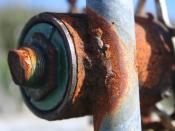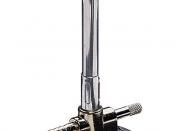GCSE Chemistry - Sodium Thiosulphate Coursework
We must produce a piece of coursework investigating the rates of reaction, and the effect different changes have on them. The rate of reaction is the rate of loss of a reactant or the rate of formation of a product during a chemical reaction. It is measured by dividing 1 by the time taken for the reaction to take place. There is five factors which affect the rate of a reaction, according to the collision theory of reacting particles: temperature, concentration (of solution), pressure (in gases), surface are (of solid reactants), and catalysts. I have chosen to investigate the effect temperature and concentration have on a reaction. This is because they are the most practical to investigate - it would take longer to prepare a solid in powdered and unpowdered form, and it is difficult to get accurate readings due to the inevitabilities of human errors, and as gas is mostly colourless it is difficult to gauge a reaction changing the pressure, and if a substance is added to give the gas colour, it may influence the outcome of the experiment.
Similarly the use of a catalyst complicates things, and if used incorrectly could alter the outcome of the experiment.
Aim: -
To see the effects of a change in temperature and concentration on the rate of a reaction. The reaction that will be used is:
Sodium Thiosulphate + Hydrochloric Acid
Na2S2O3 (aq) + 2HCl (aq)
Sodium Chloride + Water + Sulphur Dioxide +
2NaCl (aq) + H2O (l) + SO2 (g) +
Sulphur
S (s)
Two series of experiments will be carried out - one changing the temperature (while everything else remains constant) and one varying the concentration (while keeping everything else constant). Both the sodium thiosulphate and the Hydrochloric acid are...



Hi
Could you please tell me what u got for this piece of coursework as soon as possible.
thank you.
superier1
2 out of 3 people found this comment useful.